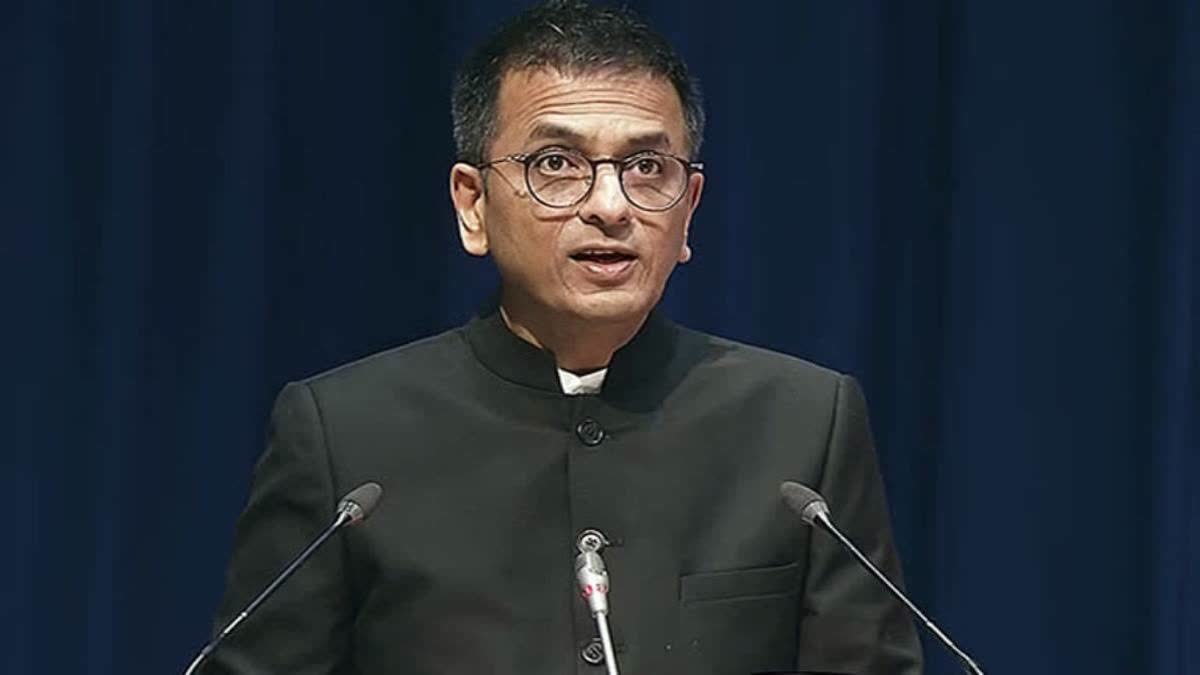New Delhi: Chief Justice of India D Y Chandrachud on Saturday described the district judiciary as the "backbone of the judiciary" and emphasised that to sustain the spine of the legal system, people should stop calling the district judiciary as the subordinate judiciary, and added that the core of judges’ function is to serve others.
Speaking at the 'National Conference of the District Judiciary', which was inaugurated by Prime Minister Narendra Modi here, the CJI said every judge has the ability to transform not only the lives of lawyers who appear in court, but the present and future of our society. “But to do so we must realise as judges, that we exist for reasons beyond our own existence. The core of our function is to serve others. That can happen when we put ourselves in the place of those who come before us with real life stories of suffering and injustice”, he said.
The CJI said a young district judge from a rural court recently shared her experiences and she said that while most members of the bar were respectful, a few lawyers frequently addressed her disrespectfully and with condescension. “Such instances can be disheartening”, said the CJI.
He said the district judiciary is aptly described as the ‘backbone of the judiciary’. “The spine is the core of the nervous system. To sustain the spine of the legal system, we must stop calling the district judiciary as the subordinate judiciary. Seventy-five years after Independence, the time has come for us to bury one more relic of the British era – the colonial mindset of subordination”, said the CJI.
The CJI said it is difficult for a judge not to be affected by the actual face of suffering that people encounter every day – a family which is coming face to face with a gruesome crime, an undertrial who is languishing for years or the children in a parental matrimonial dispute. He said judges are despite being professionals, affected by their own brush with reality and their mental health may suffer as a consequence.
“This aspect is of great consequence but it unfortunately does not receive the attention that it merits. As a step towards a more open discussion on the topic, the third session today is on judicial wellness, with a focus on holistic wellness, stress management, mental health, and quality of life. I hope that the discussion will bring to your attention practices which not only enhance your ability to discharge your duties effectively but enrich your lives”, said the CJI.
He said each case has the potential to make us more sensitive to the human condition and the human story behind the case and this, in turn, enables us to practice judging with empathy and compassion. “Judges can keep up with evolving times by updating themselves with new law and changing societal conditions. Society changes with the passage of time and while judges are required to be islands, standing apart from others in society, they must still be aware of the world around them. This is indispensable in ensuring that justice is delivered in each case”, he said.
The CJI said the district judiciary has played a crucial role in deploying technology in day-to-day affairs: district courts in the country have heard 2.3 crore cases through video conferencing.
Regarding the changing demography of the judiciary, the CJI said: “An increasing number of women have been joining the district judiciary in the past few years. Women consisted of 58% of the total recruitment for Civil Judges in Rajasthan in 2023. 66% of the judicial officers appointed in Delhi in 2023 were women. In Uttar Pradesh, 54% of the appointments for Civil Judge (Junior Division) in the batch of 2022 were women”.
“In Kerala, 72% of the total number of judicial officers are women. These are a few examples which paint the picture of a promising judiciary of the future. The second session of the conference will address gender dynamics in the judiciary as well as the need to ensure an inclusive workplace”, he added.
Read more
75 Years Of Supreme Court: PM Modi Hails SC As Upholder Of Fundamental Rights; Unveils Stamp, Coin



